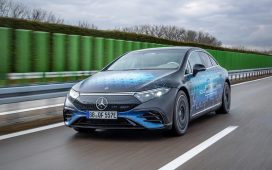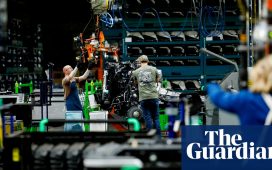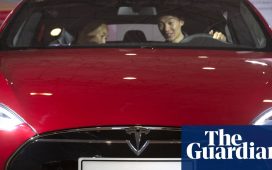The battery startup Britishvolt owed as much as £120m to creditors when it collapsed last week in a major blow to hopes of sustaining the British car industry, it can be revealed.
Creditors are expected to recover a very small proportion of the debts, according to a source with knowledge of the matter, although there are understood to be several bids for the company and its assets. EY, a professional services firm, is handling the administration.
EY is hoping to find a buyer for the remainder of the business – which has 26 staff remaining on its payroll – and the ownership of the site in Northumberland. The deadline for initial offers for the Britishvolt assets was Tuesday evening.
The failure of Britishvolt, after a desperate struggle to raise funds, came after a dismal year for the UK car industry. British factories built only 775,014 cars during 2022, the lowest annual figure since 1956, according to data published on Thursday by the Society of Motor Manufacturers and Traders (SMMT), a lobby group.
Production fell 9.8% from 2021, and declined 41% from 2019, before the pandemic. Indian-owned Jaguar Land Rover (JLR) also lost its crown as the biggest UK carmaker by volume to Japan’s Nissan.
The UK car industry has been struggling with the effects of the coronavirus pandemic for three years, with output disrupted first by lockdowns, and then by supply chain problems including a severe global shortage of computer chips and interruption to supplies of parts from Ukraine after Russia invaded.
Mike Hawes, the SMMT’s chief executive, said “2020 was bad, ‘21 was worse, ‘22 was even worse.”
The collapse in output was mainly driven by the closure of Honda’s Swindon factory. Despite the company’s denials, industry analysts said Brexit was likely a major factor in that decision. Hawes said uncertainty over the future of the UK-EU trading relationship would make it harder to attract investment to the UK.
At the same time, the industry is gearing up to move to producing battery-electric vehicles. Britishvolt had been hailed by the former prime minister Boris Johnson as an “electric vehicle battery pioneer”, and was seen – in the absence of many more established rivals – as a flagship project for the government. Attracting battery production was seen as key to retaining automotive industry jobs and the government promised to give Britishvolt £100m in funding if it could meet milestones related to equipment purchases.
Fantastic news that EV battery pioneer @BritishvoltUK will build a Gigafactory in Northumberland, creating thousands of jobs in our industrial heartlands and boosting electric vehicle production as part of our Green Industrial Revolution. https://t.co/l7Uhiii9fb
— Boris Johnson (@BorisJohnson) January 21, 2022
Britishvolt had received support from FTSE 100 companies Glencore, Ashtead and abrdn’s subsidiary Tritax. However, it ran out of cash before it could build its factory, amid revelations of profligate spending. Hawes said its collapse was a “disappointment”, if not a surprise.
“Maybe something from the ashes will arise,” he said.
Several companies have expressed a preliminary interest in the company or its assets. Tata, the Indian conglomerate that owns JLR, has also considered purchasing the site. DeaLab, a little-known Indonesia-linked private equity firm, put in an offer for the company before it went into administration.
Recharge Industries, an Australian startup, has publicly expressed an interest in buying assets from the administration. The company, run by a 38-year-old former employee of PwC, a professional services firm, is also trying to build a battery factory in Geelong in southern Australia.
Recharge put in its bid after being aided by Ian Botham, the former England cricketer, according to the Australian Financial Review (AFR), which first reported the offer. Lord Botham, who was awarded a peerage by Johnson, is now a UK-Australia trade envoy.
“The UK is home to the most innovative and exciting companies in the world. It’s fantastic to have an Australian business wanting to invest in UK-Australia trade and investment opportunities,” Botham said in a statement to AFR. Botham was approached for comment.
EY declined to comment and to provide a list of Britishvolt’s creditors until it publishes its administrator’s report in six or seven weeks’ time. EY has said it will not vote in creditor resolutions, after confirming that it is itself one of the smaller creditors after carrying out consultancy work for Britishvolt.











